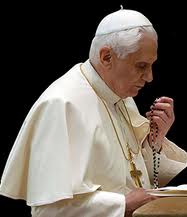 Pope Benedict XVI devoted his weekly general audience last Wednesday to St. Teresa of Avila (1515-82), one of the most revered spiritual guides in the history of the Church.
Pope Benedict XVI devoted his weekly general audience last Wednesday to St. Teresa of Avila (1515-82), one of the most revered spiritual guides in the history of the Church.
While the Pope gave a brief overview of her life and her reform of the Carmelite order, he spent most of his address on her immense contributions to Catholic spirituality, noting “her profound christocentric spirituality and her breadth of human experience.”
The most important lesson of St. Teresa, the Pope said, is her understanding of “prayer as an intimate friendship with Christ leading to an ever greater union of love with the Blessed Trinity.”
Here is an excerpt from the Holy Father’s address:
“It is not easy to summarize in a few words the profound and complex Teresian spirituality. I would like to mention some essential points.
“In the first place, St. Teresa proposes the evangelical virtues as the basis of all Christian and human life–in particular, detachment from goods or evangelical poverty (and this concerns all of us); love for one another as the essential element of community and social life; humility as love of the truth; determination as fruit of Christian audacity; theological hope, which she describes as thirst for living water–without forgetting the human virtues: affability, veracity, modesty, courtesy, joy, culture.
“In the second place, St. Teresa proposes a profound harmony with the great biblical personalities and intense listening to the Word of God. She felt in consonance above all with the bride of the Canticle of Canticles and with the Apostle Paul, as well as with the Christ of the passion and with the Eucharistic Jesus.
“The saint stressed how essential prayer is; to pray, she said, ‘means to frequent with friendship, because we frequent Him whom we know loves us.’ St. Teresa’s idea coincides with the definition that St. Thomas Aquinas gives of theological charity, as ‘amicitia quaedam hominis ad Deum,’ a type of friendship of man with God, who first offered his friendship to man; the initiative comes from God (cf. Summa Theologiae II-II, 23, 1).
“Prayer is life and it develops gradually at the same pace with the growth of the Christian life: It begins with vocal prayer, passes to interiorization through meditation and recollection, until it attains union of love with Christ and with the Most Holy Trinity. Obviously, it is not a development in which going up to the higher steps means leaving behind the preceding type of prayer, but is rather a gradual deepening of the relationship with God, which envelops our whole life. More than a pedagogy of prayer, St. Teresa’s is a true ‘mystagogy’: She teaches the reader of her works to pray while praying herself with Him; frequently, in fact, she interrupts the account or exposition to burst out in a prayer.”
For the entire text of the Pope’s general audience, click here.
Like this:
Like Loading...
 Let’s once again unite our prayers this month with those of Pope Benedict XVI. Here are the Holy Father’s intentions for October 2011, as published by the Apostleship of Prayer:
Let’s once again unite our prayers this month with those of Pope Benedict XVI. Here are the Holy Father’s intentions for October 2011, as published by the Apostleship of Prayer:
 I was perusing the vocation-related articles at
I was perusing the vocation-related articles at  On May 15, 2011, the Church throughout the world will celebrate the 48th World Day of Prayer for Vocations.
On May 15, 2011, the Church throughout the world will celebrate the 48th World Day of Prayer for Vocations. Last week, the Vatican released Pope Benedict XVI’s message for the 48th World Day of Prayer for Vocations, which will be celebrated later this spring. The entire message, entitled “Proposing Vocations in the Local Church,” may be accessed
Last week, the Vatican released Pope Benedict XVI’s message for the 48th World Day of Prayer for Vocations, which will be celebrated later this spring. The entire message, entitled “Proposing Vocations in the Local Church,” may be accessed  Pope Benedict XVI devoted his weekly general audience last Wednesday to St. Teresa of Avila (1515-82), one of the most revered spiritual guides in the history of the Church.
Pope Benedict XVI devoted his weekly general audience last Wednesday to St. Teresa of Avila (1515-82), one of the most revered spiritual guides in the history of the Church.